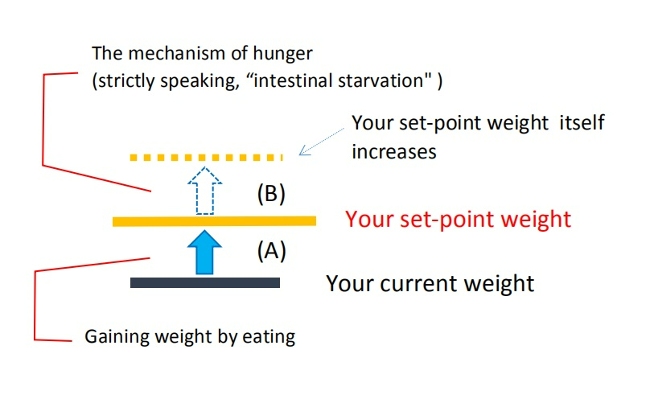Topics
09/10/2017
Eating Fat/Oil Can be a Deterrent to Gaining Weight (3 Perspectives Regarding Fat)
Contents
- Low-fat diets didn’t make people slim
- Three perspectives regarding dietary fat
(1) Sustained energy
(2) Deterrent effect of gaining weight
(3) Diet effect
<The bottom line>
Many people say that eating too much fat or oil makes you fat, since fat has more than twice as many calories as carbohydrates or proteins per gram. But some research shows that some people can lose weight even though they increase fat or oil in diets.
Which is true?
To make a long story short, I think both are correct. As I have mentioned so many times before in this article, there are two meanings to the phrase “gain weight,” and based on my theory, I can say that eating fat has three sides to it.
1.Low-fat diets didn’t make people slim

John Briffa, a British doctor and the author of “Escape the Diet Trap,” observed that low-fat diets had no effect on losing weight and that a fat-rich diet is more effective to getting slim, while taking hormone secretion, etc. into account.
“Conventional wisdom dictates that a key to successful weight loss is to keep the diet low in calories, and a key strategy deployed here is to cut back on fat. Fat contains twice as many calories as carbohydrate or protein. It's also called fat, of course. These facts do, on the face of it, seem to incriminate fat as something inherently fattening.
As a result, past attempts at weight loss may well have had you consuming enough skimmed milk and skinless chicken breasts to last you a lifetime.
On the other hand, many individuals will have had the experience of filling up on fat-packed foods such as eggs, cream, cheese and butter on ‘low-carb' regimes (such as the Atkins Diet), only to see their own fat melt away. Such experiences should, if nothing else, cause us to question the widely held belief that the fat we put in our mouths is destined to end up in the fat stores within our body.”
(Jone Briffa. 2013. Escape the Diet Trap. Page 51.)
He concluded :
- Low-fat diets are ineffective for weight loss.
- Dietary fat intakes are not strongly linked to body weight, and some evidence links increased fat intake with lower body weight.
- Insulin is the key driver of fat accumulation in the body. Dietary fat does not stimulate insulin secretion directly, and therefore has limited fattening potential.”
- Obviously, eating nothing but fat is not to be advised, but some study open up the possibility that a fat-rich diet may actually assist our weight-loss efforts[1].
I’m not a specialist or researcher. Therefore, I’d like to avoid mentioning how insulin or other hormones work in the bloodstream. But I believe I can explain why low-fat diets are ineffective for weight loss vs fat-rich diets that may help our weight-loss efforts, based on my theory.
I will explain in the next section.
2. Three perspectives regarding dietary fat
Based on my experience, I believe that people who say they gained weight by consuming fat or those who say they lost weight, are both true. However, each only highlights one aspect of the properties of fat. Focusing solely on 'calories' can obscure these different aspects.
I can say that three different effects can be expected depending on the the subject of intake (who) and/or the way of intake (such as the amount and frequency).
(1) Sustained energy

Fat is an excellent energy source and provides nine calories per gram. It’s also said that fat has several other essential functions for our health, such as being used as components of cell membranes and hormones.
But fat takes longer to digest, compared to carbohydrates or proteins. Therefore, you can see these features below:
- Foods high in fat help keep a sense of being satiated.
- High-fat diets stay longer in the stomach, so they won’t increase blood sugar level rapidly.
- Fats sustain energy for a long time.

As you can see in the diagram regarding set-point weight, within the range of (A), if you eat many calories from fat with other foods containing carbs and protein, you should gain weight steadily.
People who have a higher digestive ability for dietary fat, especially those who are dedicated to dieting to keep their weight low or those aiming to shed excess fat to achieve a muscular physique, will get especially fat in a few days if they consume high-calorie foods like sweets, cakes, and deep-fried foods. The fattening effect seems especially acute when eaten with a good amount of carbohydrates or when having only two meals a day.
With these images, many people reject a revolutionary suggestion of taking fat/oil in order to get slim, and that’s what makes this theory hard to accept.
(2) Deterrent effect of gaining weight
As you can see in the range of (B) of the diagram above, when the set-point weight itself increases, fat will work as a deterrent force(*1). I’ve stated before that one's set-point for body weight increases by inducing intestinal starvation, and since fat takes longer to digest, if you frequently eat fat/oil, there will be less chance of triggering intestinal starvation.
(*1) For those who have a higher digestive ability for dietary fat, they may not experience a deterrent force.

In fact, fat digestion begins in the small intestine. When fat enters the duodenum, a hormone called cholecystokinin (CCK) is released, which promotes the digestion and absorption of fat.
However, at the same time, it is said that CCK inhibits gastric activity, which can lead to delayed gastric emptying, and food staying in the stomach for a longer period of time. For some people, this can lead to feelings of fullness and bloating.
In any case, fat digestion is more complex than other nutrients and tends to inhibit intestinal starvation.
For example, if a thin person wants to gain weight, eating a lot of fat/oil at meals will hinder gaining weight. Have you ever wondered, “why was he/she not getting fat despite the fact that they were eating high calorie foods, such as cakes, cookies, deep-fried foods, or fatty foods?”
In fact, a low-fat, easily digestible diet is more likely to make you gain weight in terms of increasing your set-point weight itself.
(3) Dieting effect (largely categorized within deterrent effect)
As Dr. Briffa whom I’ve mentioned above said, I also believe that "in a low-carb diet, increased fat intake is linked to lower body weight” is in a way correct, as though this doesn’t apply to everyone.
It is generally believed that the reason is that fat, unlike carbohydrates, does not stimulate insulin secretion, but I will avoid mentioning that for now. Other than that, here is what I would like to add and explain based on my theory.
The time it takes for fat to be completely digested can be six to eight hours, depending on the amount of food eaten and how we combine different foods. Therefore, by consuming fat/oil every four to five hours, undigested food will remain in the stomach and the large part of the intestines for most of the day, which lead to decreased feeling of hunger and, in turn, reduced absorption ability (rate and amount).
As seen in low-carb diets, by decreasing carbohydrate intake to an extent and increasing the intake of fats, proteins, nuts, and vegetables, etc., dense nutrients are delivered to the intestines, which takes even longer to digest. If you continue with this eating habit, I believe it maximizes the dieting effect.
[Related article]
The Dilution Effect/ Pushing Out Effect of Carbohydrates
The bottom line
(1) Just because fat has nine kilo calories per gram, does not mean that dietary fat always makes people fat.
For those who have a higher digestive ability for dietary fat, especially those who normally keep their weight lower to lose weight, eating fatty food can be a cause of weight gain, but depending on the subject of intake (who) and/or how you eat it (how much, how often), fat can have a deterrent effect to further weight gain or diet effect.
(2)Fat takes longer to digest than other nutrients, so if you frequently eat fat, undigested food tends to remain in the intestines. This makes intestinal starvation less likely to occur, which tends to deter further weight gain in the sense that one’s set-point weight doesn’t change.
(3)A diet low in carbohydrates but high in protein and fat may have a dieting effect. It is generally believed that the main reason is that fat, unlike carbohydrates, does not stimulate insulin secretion.
My theory, I would add, is that ingesting fats every four to five hours will leave undigested food in the wide range of intestines, which will lead to reducing feeling of hunger and, in turn, decreased absorption ability. Continuation of this condition could have a weight-loss effect.
References:
[1] Briffa J. Escape the Diet Trap. Pages 58-61.
